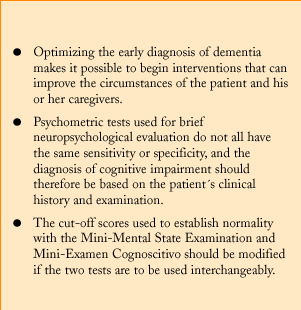The interesting study by Vinyoles Bargalló and colleagues in this issue illustrates the problems in establishing a diagnosis of cognitive impairment and dementia on the basis of psychometric instruments alone. The difficulties are greater for patients whose cognitive functioning is at the frontier between normality and pathologic function, and when brief tests that explore cognitive functioning are used to screen for cognitive impairment. It should not be difficult to diagnose dementia when the patient´s clinical signs have been well established. The diagnosis can be based on the DSM IV or CIE 10 criteria; both note that the essential clinical features of dementia are impaired memory associated with impairments in abstract thinking and judgement, and other disorders of higher intellectual functions or personality not caused by altered consciousness. The degree of impairment is severe enough to interfere with work, social activity and relations with others. This description, and hence its diagnostic criteria, should be used as a standard to diagnose dementia, according to an expert panel of the American Academy of Neurology.1
When a patient presents with the characteristics listed above, examination of his or her cognitive status with brief psychometric instruments such as the Mini-Examen Cognoscitivo (MEC) or the Spanish version of the Mini-Mental State Examination (MMSE)can increase or confirm suspicions of cognitive impairment raised by information provided by the family and by the physician´s initial examination. Confirmation of cognitive impairment in such patients is straightforward when the scores on the brief tests are far below the cut-off score (for example, lower than 18 on the MEC and MMSE), regardless of which test is used. Under these circumstances agreement between the results of different instruments can be expected to be high, although the study by Vinyoles and colleagues provides no data regarding this situation. In this case agreement is good because the scores on brief neuropsychological screening instruments are interpreted in a dichotomous fashion as either the presence or absence of cognitive impairment. In contrast, when the patients fulfils some of the criteria for dementia but obtains scores close to the cut-off point on brief psychometric tests, the information provided by the tests cannot be used uncritically. The low agreement between test results, and differences in sensitivity and specificity, can modify the diagnosis depending on which test is used. This situation is especially relevant for older persons and those with little formal education. For these persons all brief tests may have a «diagnostic ceiling» that makes it necessary to resort to fuller neuropsychological testing to reach a diagnosis.2
Although screening or the early diagnosis of dementia have not been recommended,3,4 brief neuropsychological instruments are often used as diagnostic tests for cognitive impairment or dementia in international epidemiological studies. In clinical practice they are also used to confirm previously suspected cognitive impairment. The results of the study by Vinyoles and colleagues are thus important for clinical and research practice whenever brief neuropsychological tests are used to screen for or to reach a rapid diagnosis of cognitive impairment. Their findings show that in their setting, the two instruments are not interchangeable if the cut-off scores used to diagnose cognitive impairment are not modified. In other words, the same patient might be labeled as demented on the basis of the score on one test, but not demented on the basis of the score on the other.
The importance of having reliable instruments to establish an early diagnosis of suspected or confirmed cognitive impairment or dementia (if impairment persists for long) lies in the need to optimize the detection of this clinical problem to improve patient care. Often, older patients are taken by their relatives to different doctors because of mild disorders in personality, behavior or memory that go undiagnosed, leaving the patients´ symptoms unexplained. In such cases family members are condemned to facing delays in the correct diagnosis, and to living with a parent who has ceased to be the person they once were, although nobody can explain why. The time lost in reaching a diagnosis leads to a burden of care that can have significant effects on the caregivers. With an early diagnosis, appropriate interventions can be initiated to improve family dynamics.
If the promising results of anticholinesterase drug treatment are confirmed, early detection of dementia will be crucial to ensure that treatment is begun when it is most likely to be most beneficial, ie, in the early stages, to delay the rapid progression cognitive impairment.
The American Academy of Neurology expert group has noted that the use of brief psychometric instruments such as the MMSE should be considered appropriate clinical practice for the detection of dementia in those patients for whom there is a clinically-based suspicion of cognitive impairment.3 As regards the Spanish population, additional data are needed to determine how this and other tests perform in the diagnosis of cognitive impairment, and to develop concrete guidelines to standardize results depending on individual characteristics.
When the results of neuropsychological tests are interpreted, the following points should be kept in mind: 1) the diagnosis of suspected impairment should be based on the patient´s clinical history and on a brief neuropsychological examination with the test, and 2) the sensitivity and specificity of each test offer information that implies that dementia cannot be entirely confirmed or ruled out on the basis of the results. Therefore, when there is doubt, monitoring the patient´s clinical course and cognitive function (with follow-up visits every 3 to 6 months, for example) can help to establish a diagnosis of impaired intellectual functioning. Referral to specialized services where fuller neuropsychological examination can be done will improve diagnostic procedures for more complex cases.









